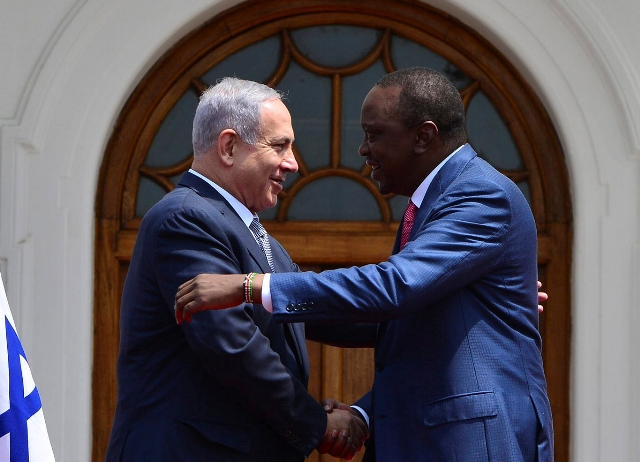Netanyahu took off for Kenya, where he we will work to further boost Israel’s ties with several African nations.
By: Aryeh Savir, World Israel News
Prime Minister Benjamin Netanyahu took off on Tuesday for Nairobi, Kenya, to attend the inauguration of Kenyan President Uhuru Kenyatta and a series of meetings with African heads of state.
“I am now leaving for my third visit to Africa within a year-and-a-half. I will meet there with newly re-elected Kenyan President Uhuru Kenyatta and with 10 African leaders as well. Our intention is to deepen ties with Africa also by forging links with countries that we do not have diplomatic relations with,” Netanyahu stated before takeoff.
Netanyahu noted that legations from four African countries have opened in Israel in the past two years. He expressed hope that by the end of the year, he will be able to announce the opening of a new Israeli embassy “in an African country, and our hand is still extended.”
Netanyahu will attend and address an official lunch hosted by Kenyan President Kenyatta on the occasion of his inauguration. Also attending the event will be the presidents of Tanzania, Uganda, Zambia, Rwanda, Togo, Botswana and Namibia, as well as the Prime Minister of Ethiopia and other leaders.
The Israeli leader will then hold a series of bilateral meetings with attending heads of state.
Netanyahu was last in the African country in July 2016. He has made improving relations with African nations a priority.
In his address to AIPAC last March, Netanyahu observed that Israel has “diplomatic relations with 161 countries, more than at any time in our history.”
Last July, he made a historic trip to East Africa, where he visited Uganda, Kenya, Rwanda and Ethiopia. Weeks later, the Republic of Guinea, a Muslim-majority African nation, restored diplomatic ties with Israel after a 49-year break.
In August, Senegal and Guinea, two Muslim-majority West African nations, sent their first-ever full-time ambassadors to Israel.
Israel has a long history of sharing its expertise with African countries, and Jerusalem hopes that stronger ties will lead to a shift in voting trends at the UN and other global forums, thus reversing what Netanyahu has labeled the “automatic majority against Israel.”


